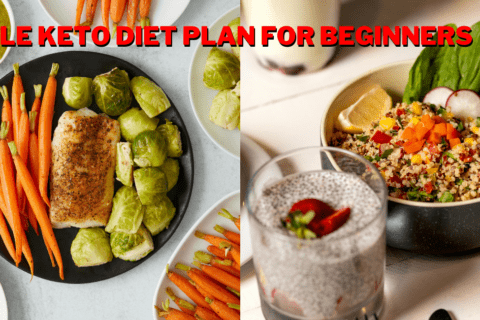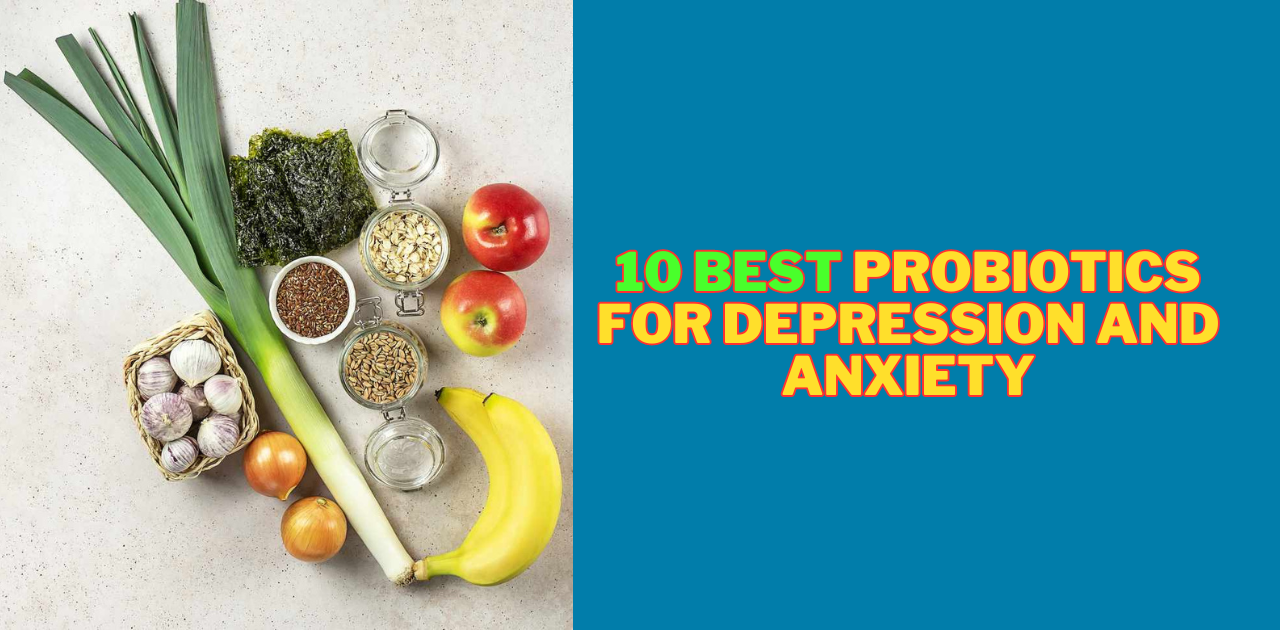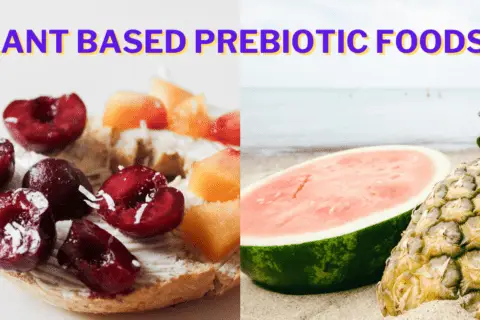Understanding Prebiotics and Probiotics: Prebiotics are non-digestible fibers that feed beneficial bacteria in the gut, while probiotics are live bacteria that contribute to a healthy microbiome. Together, they support a balanced gut environment, crucial for overall health, including mental well-being.
The connection between our gut and brain is more profound than we might think. Often referred to as the “gut-brain axis,” this relationship highlights how our digestive health can significantly impact our mental well-being. In this blog, we’ll explore the roles of prebiotics and probiotics in maintaining mental health, backed by scientific evidence and practical tips.
10 Best Probiotics for Depression and Anxiety
Probiotics can play a significant role in alleviating symptoms of depression and anxiety by promoting a healthy gut microbiome, which in turn influences brain function and mood regulation. Here are ten of the best probiotics known for their positive effects on mental health:
- Lactobacillus helveticus R0052 – Known for its ability to reduce anxiety and depression symptoms, this strain has been shown to improve overall mood by modulating the gut-brain axis.
- Bifidobacterium longum R0175 – This strain is effective in reducing stress and anxiety levels by promoting a healthy balance of gut bacteria, which can positively influence the production of neurotransmitters.
- Lactobacillus rhamnosus GG – Well-studied for its mental health benefits, this probiotic strain has been shown to reduce symptoms of anxiety and depression by enhancing the gut microbiome’s diversity.
- Bifidobacterium bifidum – Known for its role in improving gut health and reducing inflammation, Bifidobacterium bifidum can help alleviate symptoms of depression and anxiety.
- Lactobacillus plantarum – This versatile strain not only supports digestive health but also has been linked to reduced symptoms of stress and improved mental well-being.
- Lactobacillus casei Shirota – Research indicates that this strain can help reduce psychological stress and improve mood by positively influencing gut health.
- Bifidobacterium infantis 35624 – Known for its anti-inflammatory properties, Bifidobacterium infantis can help reduce inflammation-related symptoms of depression and anxiety.
- Lactobacillus reuteri – This strain has been shown to improve mood and reduce symptoms of depression by enhancing the gut’s ability to produce serotonin, a key neurotransmitter for mood regulation.
- Bifidobacterium breve – Effective in reducing symptoms of anxiety and depression, Bifidobacterium breve helps maintain a healthy gut microbiome, which is crucial for mental health.
- Lactobacillus paracasei – This probiotic strain can help reduce stress and improve overall mental well-being by supporting a healthy balance of gut bacteria.
Prebiotics and probiotics work symbiotically. Prebiotics serve as food for probiotics, promoting their growth and activity. This relationship helps maintain a healthy balance of gut bacteria, which is essential for digestive health and has far-reaching effects on overall health, including mental wellness.
The Gut-Brain Axis: The gut-brain axis is a complex communication network linking the gut and the brain. The gut microbiome, consisting of trillions of microorganisms, plays a key role in this communication. A healthy gut microbiome can influence brain function and mood, making gut health an essential factor in mental health management.
Recent research has shown that gut bacteria produce neurotransmitters such as serotonin, which plays a crucial role in mood regulation. Approximately 90% of serotonin is produced in the gut, highlighting the importance of maintaining a healthy gut microbiome for mental health.
Probiotics for Mental Health: Scientific research has shown that probiotics can positively affect mental health. Certain strains of probiotics have been found to reduce symptoms of anxiety, depression, and stress by influencing the production of neurotransmitters and reducing inflammation.
For example, Lactobacillus helveticus and Bifidobacterium longum have been shown to reduce symptoms of anxiety and depression. These strains can modulate the gut-brain axis, reducing inflammation and enhancing the production of neurotransmitters that promote mental well-being.
Incorporating these probiotic strains into your diet through supplements or fermented foods can significantly impact your mental health. Always consult with a healthcare professional to determine the best probiotic regimen for your specific needs.
Choosing the Right Probiotics: Not all probiotics are created equal. When selecting a probiotic for mental health, look for strains like Lactobacillus helveticus, Bifidobacterium longum, and Lactobacillus rhamnosus, which have been shown to have mental health benefits.
It’s essential to choose high-quality probiotic supplements that contain these strains and have been tested for potency and efficacy. Additionally, incorporating probiotic-rich foods such as yogurt, kefir, sauerkraut, and kimchi into your diet can help maintain a healthy gut microbiome.
Prebiotics and Anxiety: Prebiotics can also play a role in mental health by supporting the growth of beneficial bacteria that influence brain function. Studies have found that prebiotics can help reduce anxiety symptoms by promoting a healthy gut microbiome.
For example, a study published in the journal Psychopharmacology found that participants who consumed prebiotics experienced lower levels of the stress hormone cortisol and reported feeling less anxious. Prebiotic-rich foods include garlic, onions, leeks, asparagus, and bananas.
Probiotics for Specific Populations: Different populations can benefit from tailored probiotic regimens. For example, women may find specific strains helpful for mental health, while others may seek probiotics specifically targeting depression.
Women may benefit from probiotics like Lactobacillus reuteri and Lactobacillus fermentum, which have been shown to support vaginal health and overall well-being. For individuals dealing with depression, Bifidobacterium longum and Lactobacillus helveticus are promising strains that have been shown to alleviate symptoms of depression.
Practical Tips for Incorporating Prebiotics and Probiotics into Your Diet: Incorporate prebiotic-rich foods like garlic, onions, and bananas, and probiotic-rich foods like yogurt, kefir, and sauerkraut into your diet. Supplements can also be an effective way to ensure adequate intake.
When choosing supplements, look for products with multiple strains of probiotics and a high CFU (colony-forming unit) count. It’s also important to consume a variety of prebiotic foods to support the growth of different beneficial bacteria in the gut.
Resources for Mental Health Support: It’s important to seek professional guidance when dealing with mental health issues. Various resources and support networks are available to help you on your journey to better mental health.
Organizations like the National Alliance on Mental Illness (NAMI), Mental Health America (MHA), and the Anxiety and Depression Association of America (ADAA) provide valuable resources, support groups, and information on mental health. Additionally, consulting with a healthcare professional can help you create a personalized plan to improve your gut and mental health.
Conclusion: The gut-brain connection is a vital aspect of our overall health. By understanding and utilizing prebiotics and probiotics, we can take significant steps towards improving our mental well-being. Explore the power of a healthy gut and its profound impact on your mind today.
READ ALSO : Chronic Lower Respiratory Disease: Symptoms, Causes
DISCLAIMER : The information shared in our articles is intended solely for informational purposes and should not be considered as medical advice. Consultation with a specialist is mandatory for any disease or specific health condition. The process of treatment should only be initiated based on the advice of a doctor/expert.
Super Plant Based Prebiotic Foods for Gut Health
One of the lesser-discussed yet incredibly important aspects of this dietary choice is the role…
August 3, 2024 0
Keto Beginners
Simple keto diet plan for beginners
The Simple keto diet plan for beginners, or keto, is a low-carb, high-fat diet that…
August 2, 2024 1 Comment



1 thought on “10 best probiotics for depression and anxiety”